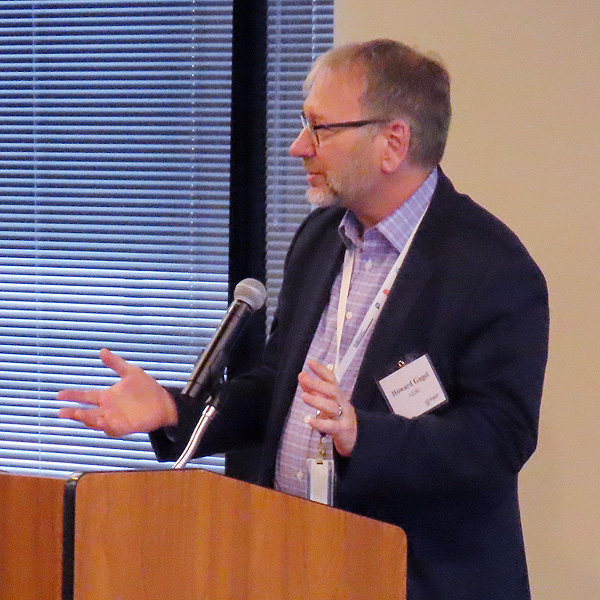
ATLANTA — At the first day of the North American Generator Forum’s Annual Compliance Conference, held at NERC’s headquarters, NERC Vice President of Engineering and Standards Howard Gugel jokingly complained that because he worked for the ERO, most attendees probably automatically thought of him as “the standards guy.”
“Unfortunately, [for] a lot of people, when you mention the name NERC, your mind immediately goes to standards and compliance. And of course, that’s what we do,” Gugel said. “But we do things other than standards, right? We do reliability assessments. … We also monitor the bulk electric system. … And so when things occur on the system, when reliability coordinators alert us to things, we’re able to go in and look to see how things are evolving in the system and keep folks appraised of how things are evolving.”
Gugel was at the conference to discuss NERC’s response to what he called “the brave new world of resilience,” which is being brought about by the interconnected trends of “decarbonization, decentralization and digitization.”
The first of these refers to the growth of carbon-free generation sources like wind and solar, whose energy output is dependent on the weather and must be managed in a completely different way than traditional generators. Decentralization, which refers to the spread of behind-the-meter resources, is linked to the growth of rooftop solar panels, as well as battery energy storage systems. Meanwhile, digitization — the reliance on the internet to facilitate the management of these new technologies — underpins each of these developments.
 Howard Gugel, NERC | © RTO Insider LLC
Howard Gugel, NERC | © RTO Insider LLCA major challenge in the management of these new resources, Gugel said, is that because they do not belong to the BES, they do not actually fall under NERC’s reliability standards, even though they make up a significant fraction of the asynchronous generation on the bulk power system: 16.2% as of 2021. By comparison, only 3% of synchronous generation connected to the BES did not fall under NERC’s standards last year.
Even renewable resources that are connected to the BES pose major challenges for grid operations because of their very different behavior patterns. Gugel said that unlike inertial generators, whose output declines gradually in the event of a problem, giving operators a bit of time to respond, solar facilities in particular behave more like a “step function” with output falling right away.
“You can see 1,000 [to] 2,000 MW come off immediately, and then five minutes later when that momentary cessation is done, it all comes back at the same time. That causes the operators to really be concerned about how they control that system,” Gugel said.
The theme of digitization creates challenges related to the cutting-edge nature of many new generation resources, which means they need constant internet connectivity to monitor, troubleshoot and deliver software updates that in some cases come from their manufacturers overseas. This makes these facilities an attractive target for hackers, especially because a relatively small amount of companies are responsible for a large proportion of grid-connected hardware. If an intruder can break into one manufacturer’s systems, they could be in a position to conduct a major operation against the North American power grid.
Returning to the topic of standards, Gugel assured the audience that NERC is taking the challenge posed by the grid’s evolution seriously. The organization’s efforts range from standard development projects aimed at revising the facility interconnection requirements, to potential moves to re-evaluate the definition of the BES itself so that NERC’s standards can apply to behind-the-meter resources that they currently don’t cover.
“It’s obvious that we can’t just stay where we’re at; the status quo is just going to make us farther and farther behind [on] this reliability issue,” Gugel said. “The time to act is now, so you’ll hear more about [the] evaluation of the definition of BES and possible changes to registration criteria as we go forward.”



